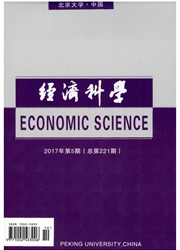

 中文摘要:
中文摘要:
本文使用中国家庭追踪调查(CFPS)2010年数据,分析了1949-2010年初婚婚姻匹配模式的变迁,研究了初婚婚姻匹配对生活满意度及离婚风险的影响,从年龄、教育和家庭背景三个维度估计了"婚姻梯度"匹配对生活满意度的不同作用。此外,我们还发现了几个婚育变量对婚姻的不同影响:初婚年龄与生活满意度负相关,与婚姻稳定性呈现"U型"关系;婚前同居对生活满意度没有显著影响,但提高了男性离婚概率;尽管儿子数量与生活满意度负相关,但大幅增强了婚姻稳定性。
 英文摘要:
英文摘要:
Using CFPS2010 baseline data,we analyze the matching patterns of first marriage from1949 to 2010 to study the effect of first marriage matching on life satisfaction and divorce risk,and then estimate the different effects of"marriage gradient"matching on life satisfaction of couples from three dimensions, which are age,education and family background. In addition,we also find different effects of several marriage and fertility variables: first marriage age is negatively related to life satisfaction,but presents a "U"shaped relation with marital stability; premarital cohabitation does not significantly affect life satisfaction,but increases the divorce probability of male; although the number of sons is negatively related to life satisfaction,it increases marital stability sharply.
 同期刊论文项目
同期刊论文项目
 同项目期刊论文
同项目期刊论文
 期刊信息
期刊信息
